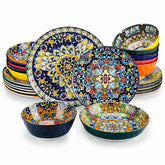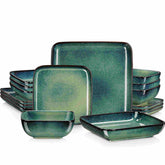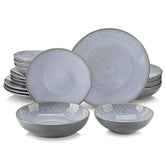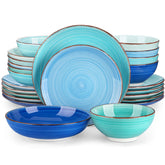Sustainable Tableware Options: Eco-Friendly and Stylish Stoneware Alternatives
As consumers become more aware of the environmental impact of their daily choices, many are searching for ways to reduce their carbon footprint in all areas of their lives, including their homes and kitchen. One area where significant changes can be made is in the use of sustainable tableware options. While traditional plastic and disposable tableware have long been the norm, eco-friendly alternatives are becoming more popular, including stoneware.
Stoneware is a type of clay-based ceramic that is fired at high temperatures, making it durable, strong, and resistant to chipping and cracking. Stoneware can also be glazed, which not only adds to its strength but also makes it non-porous, preventing the absorption of bacteria and odors. These qualities make stoneware an ideal material for use in tableware.
When choosing stoneware dinnerware, it is important to look for pieces that are made from sustainably sourced materials and are produced using eco-friendly manufacturing processes. Additionally, stoneware pieces should be lead-free and free from harmful chemicals, ensuring they are safe for use in food preparation and consumption.
There are several eco-friendly stoneware options available on the market, including:
Handmade Stoneware: Many artisans make stoneware by hand, creating unique, one-of-a-kind pieces. Handmade stoneware is often produced using sustainable and eco-friendly processes, making it an excellent choice for those looking for a more environmentally conscious option.
Recycled Stoneware: Some stoneware is made from recycled materials, including broken or discarded pieces of stoneware. This reduces waste and minimizes the environmental impact of the manufacturing process.
Organic Stoneware: Organic stoneware is made from clay that has been sourced from organic, pesticide-free fields. This ensures that the clay is free from harmful chemicals and toxins that could leach into food.
Stoneware can be used in a variety of tableware items, including plates, bowls, cups, and even cutlery. Stoneware tableware comes in a range of colors and styles, making it easy to find pieces that complement your personal style and home décor.
Another benefit of stoneware is its longevity. Unlike disposable tableware, stoneware can be used for years, reducing waste and saving money in the long run. When properly cared for, stoneware can last for decades, making it a sustainable choice for those looking to reduce their environmental impact.
When using stoneware, it is important to care for it properly to ensure its longevity. Stoneware should be hand-washed, as the high temperatures of a dishwasher can cause cracking and damage to the glaze. Additionally, stoneware should be handled with care to avoid chipping or cracking.
One important aspect of sustainability to consider when choosing stoneware is the impact of its production on the environment. Stoneware is generally considered to be more environmentally friendly than other types of tableware, such as plastic or disposable options. However, there are still potential environmental impacts associated with its production.
The production of stoneware requires a significant amount of energy, both in terms of firing the ceramics and transporting the materials to the production facility. Additionally, the glazes used on stoneware can contain chemicals that are harmful to the environment. For these reasons, it is important to choose stoneware that is produced using sustainable and eco-friendly manufacturing processes.
One way to ensure that your stoneware is produced sustainably is to choose pieces that are made by local artisans. This reduces the environmental impact of transporting the materials to the production facility and supports local economies. Additionally, many small-scale producers use sustainable and eco-friendly processes to produce their products, making them an excellent choice for those looking for environmentally conscious options.
Another way to ensure the sustainability of stoneware production is to choose pieces that are certified by third-party organizations. These organizations certify that the stoneware is produced using sustainable and eco-friendly processes and materials, ensuring that your tableware has a minimal environmental impact.
In addition to stoneware, there are other sustainable tableware options available on the market, including bamboo, glass, and even edible options such as edible spoons and plates made from wheat bran or cornstarch. These options are often biodegradable and compostable, reducing waste and minimizing the environmental impact of tableware.
When choosing sustainable tableware options, it is important to consider not only the environmental impact of the product but also its practicality and durability. Sustainable tableware should be able to withstand regular use and should be easy to care for, ensuring that it can be used for years to come.
In conclusion, choosing sustainable tableware options, such as stoneware, is an excellent way to reduce your environmental impact while still enjoying stylish and practical tableware. Stoneware is a durable, long-lasting option that comes in a variety of styles and colors, making it easy to find pieces that complement your personal style and home décor. When choosing stoneware, it is important to look for pieces that are produced using sustainable and eco-friendly processes and materials, ensuring that your tableware has a minimal environmental impact. By making small changes, such as switching to sustainable tableware options, we can all do our part to reduce our environmental impact and create a more sustainable future.











